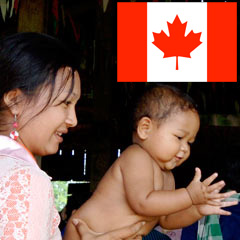Keep our word
By Catholic Register Editorial With much fanfare a decade ago, international leaders unveiled a noble 15-year blueprint to reduce world suffering. The ambitious plan, named Millennium Development Goals, heralded significant reduction in poverty and hunger, expansion of primary education and gender equality, investment in child and maternal health and HIV/AIDS, and achievement of environmental sustainability.
With much fanfare a decade ago, international leaders unveiled a noble 15-year blueprint to reduce world suffering. The ambitious plan, named Millennium Development Goals, heralded significant reduction in poverty and hunger, expansion of primary education and gender equality, investment in child and maternal health and HIV/AIDS, and achievement of environmental sustainability.It was a bold undertaking launched before 9/11 sent many richer nations to war and before international financiers sent the world into recession. Without those crises, the challenge was daunting. With them, it became Herculean.
So when leaders convened at the United Nations recently to assess their progress, the sad but unsurprising conclusion was they lagged far behind what is required to hit the 2015 objectives. Sadder still, there seemed little impetus to turn things around.
Cardinal Peter Turkson, president of the Vatican’s Pontifical Council for Justice and Peace, urged UN nations to honour their original commitments. He encouraged them to continue the war on poverty by building solidarity with the poor, creating fair financial and trade policies, promoting good government and, above all, offering protection to the political, religious and economic rights and freedoms of all disadvantaged citizens of the world.
While his words received intellectual support, few leaders were seen reaching for their chequebooks.
In dollar terms, the need is great. UN Secretary-General Ban Ki-moon implored rich nations to eliminate an annual funding shortfall of $20 billion. The shortfall results largely from many nations reneging on pledges to contribute 0.7 per cent of gross national income to international aid. Some small European countries have made good and Britain promises to do so by 2013, but G8 heavyweights such as the United States, Canada, Japan, Italy and Germany are laggards.
Canada’s share of the underfunding is calculated at $800 million annually. In 2009, the Stephen Harper government directed just 0.3 per cent of the nation’s wealth to foreign aid, less than half of what successive governments have pledged since 2000. Now, regrettably, instead of developing a strategy to boost aid to the promised level, Harper will freeze aid next year as part of his plan to eliminate multi-billion-dollar budget deficits.
In the past we have praised Harper’s leadership in focussing world attention on child and maternal health in the developing world. He used last summer’s G8 and G20 summits to raise more than $5 billion for that cause. But that dynamism was absent at the recent United Nations conference.
Harper used his minutes at the microphone to tout Canada’s recent accomplishments but failed to use the stage to set Canada on a three- or five-year track to finally honour all its foreign aid promises. He was not alone. Leader after leader praised the objective of building a better world but few came prepared to pay for it. The sentiment rang hollow without the money to back it up.
Please support The Catholic Register
Unlike many media companies, The Catholic Register has never charged readers for access to the news and information on our website. We want to keep our award-winning journalism as widely available as possible. But we need your help.
For more than 125 years, The Register has been a trusted source of faith-based journalism. By making even a small donation you help ensure our future as an important voice in the Catholic Church. If you support the mission of Catholic journalism, please donate today. Thank you.
DONATE
